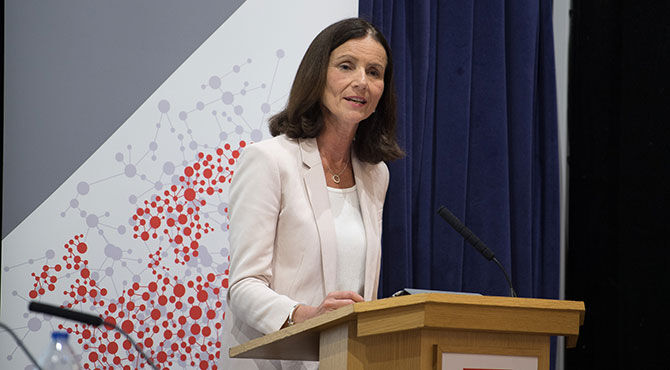Access to staff as key as EU trade deal – CBI director-general
In a major speech CBI director General, Carolyn Fairbairn, will say businesses need time to adjust to new post-Brexit migration rules in order to safeguard investment.

The CBI
Clear migration policy required
Speaking at a CBI event at Babraham Hall in Cambridge on productivity, the CBI Director-General will urge the UK Government to provide ‘clarity and certainty over migration policy – now and in the future’ to maintain investment in the UK.She will also encourage the government to guarantee EU citizens’ rights even in the event of ‘no deal’ scenario, highlight firms’ need for a period of adjustment to a new migration system and outline why the Tier 2 non-EEA visa route is not appropriate for EU nationals.Ms Fairbairn will propose the UK should have a more controlled yet open arrangement with the EU, reflecting 40 years of economic integration. She will add that with record employment rates, limiting access to EU workers would leave companies unable to get the staff they need to grow.Related stories:
- EU migration to UK plummets amid Brexit fears
- UK migrant health surcharge set to double
- MPs condemn lack of post-Brexit immigration plan
Maintaining access to people and skills
Setting out how the UK economy is already being affected, Ms Fairbairn will say, “One issue absolutely vital to productivity is business’ access to people and skills.“With record employment rates – and without access to EU workers – firms are unable to get the staff they need to grow.“For business, this issue is as important as our future trade deal with the EU.“Put simply, skills shortages threaten to slow down growth.“Training British workers isn’t enough on its own, nor is just hiring from overseas - business needs both.“The foundations of a great system are in place - in employer-led apprenticeships, T-levels and in the new National Retraining Partnership which every day helps people get back into work."But shortages are deterring investment today."Labour shortages across the economy
Labour shortages aren’t exclusive to lower-skilled roles, they’re having an impact right across the economy, Ms Fairbairn will add, “We’ve spoken to businesses in the Cambridge tech hub.“They’re worried that Brexit will put off overseas workers who don’t know if they’ll be welcome, or even allowed to stay.“One business, Cambridge Medical Robotics, rightly asked…‘“If our competitors in Silicon Valley can have their pick of people from around the world, why do we think it’s a good thing to deny ourselves the same ability?”’“And we know from the Federation of Small Business that one in five small businesses rely on skills and labour from the EU.“Let’s remember - this isn’t just about the best and brightest – it’s about giving companies of all sizes access to the skills and labour they need to succeed.“This is urgent.“Business is looking for answers – but is being met by silence.“Uncertainty about access to European workers and delays to the immigration White Paper have left businesses frustrated.“In conversations with firms in every region and nation, we’re hearing the same thing.“We need clarity and certainty over migration - now and in the future.Increasingcertainty over migration
Providing a pathway to certainty over migration for firms is a three-step process, Ms Fairbairn will say, “First, let’s end the game of human poker by telling EU citizens that they’ll be able to stay in the UK – crucially – even in the event of a no-deal scenario.“Second, no matter the outcome of talks in Brussels, business needs to know that when Freedom of Movement as we know it ends there will be a substantial transition period to the new rules on migration.“Once agreed business will need time to adjust to the new rules.“Because, without time to prepare, investment will continue to stall.“Third, we need to say ‘no’ to extending the ‘Tier 2’ visa route to EU citizens.“It is costly, complex and unaffordable for smaller businesses.“Copying and pasting the Tier 2 system would be a disaster for the UK, damaging competitiveness and stopping businesses getting the people and skills they need to compete globally.“Instead we need a system which gives firms the confidence to keep investing in every part of the UK.“One that ensures that firms of every size and sector get the talent they need for years to come.“So now, let’s stop talking about it and instead get it sorted.”
For related news and features, visit our Serviced Apartments section. Look out for the launch of 2018’s Relocate Awards, entry is now open. Relocate’s new Global Mobility Toolkit provides free information, practical advice and support for HR, global mobility managers and global teams operating overseas.
 Access hundreds of global services and suppliers in our Online Directory
Access hundreds of global services and suppliers in our Online Directory
©2026 Re:locate magazine, published by Profile Locations, Spray Hill, Hastings Road, Lamberhurst, Kent TN3 8JB. All rights reserved. This publication (or any part thereof) may not be reproduced in any form without the prior written permission of Profile Locations. Profile Locations accepts no liability for the accuracy of the contents or any opinions expressed herein.






























